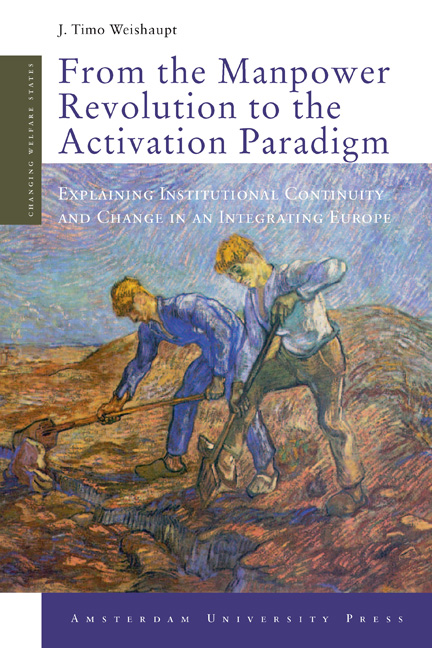 From the Manpower Revolution to the Activation Paradigm
From the Manpower Revolution to the Activation Paradigm Book contents
- Frontmatter
- Contents
- List of Boxes, Figures and Tables
- Abbreviations
- Acknowledgements
- I Introduction
- II Theoretical Approach
- Part I Origin and Crisis of European Labour Market Policy Regimes
- Part II The Emergence of the Activation Paradigm
- List of Interviews and Personal Conversations
- Notes
- Bibliography
- Index
- Changing Welfare States
III - Origin of European Labour Market Policy Regimes and the Manpower Revolution
Published online by Cambridge University Press: 20 January 2021
- Frontmatter
- Contents
- List of Boxes, Figures and Tables
- Abbreviations
- Acknowledgements
- I Introduction
- II Theoretical Approach
- Part I Origin and Crisis of European Labour Market Policy Regimes
- Part II The Emergence of the Activation Paradigm
- List of Interviews and Personal Conversations
- Notes
- Bibliography
- Index
- Changing Welfare States
Summary
Even though most of the legal framework for active labour market policy was not formally introduced until the early 1950s, it is important to provide information about the path-creating efforts launched by European governments during the pre-WWII era. Accordingly, chapter III first offers a brief overview of emergence of the very concept of unemployment and the origins of labour market policy regimes. Subsequently, I elaborate on the genesis of the Swedish concept of ALMPs, initially known as active manpower policies, followed by a succinct introduction to the OECD, which successfully diffused this concept. This chapter then precedes with a synopsis of subsequent policy changes in five European countries: Denmark, Germany, Austria, the UK, and Ireland, in that order. Chapter IV discusses the international, i.e., OECD, and national responses to the two oil crises during the 1970s, which triggered significant economic challenges across Western Europe, including a significant increase in unemployment, spiralling inflation, and economic stagnation. The consequences and reactions to the two oil crises are covered sequentially, starting with the international dimension and followed by domestic policy responses. Both of these chapters are designed as – at times quite detailed and yet, necessarily incomplete – reconstructions that rely primarily, but not exclusively, on the existing secondary literature and officially published policy documents. The main purpose of these chapters is to provide both a historical backdrop and a benchmark for the assessment of contemporary institutional evolution.
Locating the Origins of Unemployment and Labour Market Policy
Throughout human history, there have always been people without stable sources of income, who would nowadays be considered unemployed. However, the very term “unemployment” as we know it today only arose as a meaningful concept with the rise of manufacturing and industrialisation, i.e., during the birth of capitalism in the 19th century (cf., e.g., Salais et al. 1986; Whiteside and Salais 1998). Prior to industrialisation, most people worked in agriculture, and for the majority of those who did not, work was often neither “stable” nor “institutionalised”. Poor people without work were often employed on a temporary or seasonal basis as work became available (cf., Zimmermann 2006), and “unemployment” was neither a publicly acknowledged problem nor discussed in any systematic way by economists (Harris 1996, 52).
- Type
- Chapter
- Information
- From the Manpower Revolution to the Activation ParadigmExplaining Institutional Continuity and Change in an Integrating Europe, pp. 73 - 104Publisher: Amsterdam University PressPrint publication year: 2012


